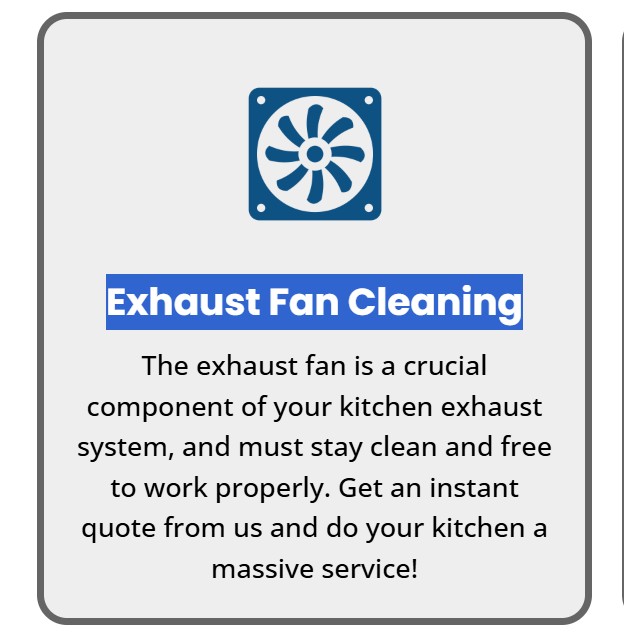
A clean kitchen is more than just spotless counters and fresh ingredients. One of the most overlooked tasks is kitchen exhaust fan cleaning. Over time, grease, dust, and smoke stick to the fan blades, filters, and ductwork, reducing airflow and increasing fire hazards. Regular cleaning helps keep your kitchen safe, fresh, and energy-efficient.
In this guide, you’ll learn why cleaning your exhaust fan matters, how often to do it, and a simple step-by-step process to get the job done right.
Why Is Kitchen Exhaust Fan Cleaning Important?
Your exhaust fan plays a big role in keeping your kitchen clean and safe. It removes smoke, grease, and odors, helping to maintain good air quality. When the fan is dirty, it can cause several issues:
- Fire Risk: Grease buildup is highly flammable and can cause dangerous kitchen fires.
- Reduced Airflow: A clogged exhaust fan struggles to pull out smoke and heat, making your kitchen uncomfortable.
- Higher Energy Costs: A fan covered in grease works harder, using more electricity.
- Unpleasant Odors: Stale grease smells linger when the fan isn’t working properly.
Regular cleaning prevents these problems, improving efficiency and safety in your kitchen.
How Often Should You Clean the Kitchen Exhaust Fan?
The frequency of cleaning depends on how often you cook. Here’s a simple guide:
- Home Kitchens: Every 3 to 6 months.
- Restaurant Kitchens: Every 1 to 3 months, depending on cooking volume.
- High-Volume Kitchens: Monthly cleaning is best to prevent grease buildup.
If you notice strong odors, reduced suction, or excessive grease, it’s time for a deep clean.
Tools and Supplies Needed
Before you start, gather these supplies:
- Warm, soapy water
- Degreaser spray
- Baking soda
- Vinegar
- Soft brush or sponge
- Screwdriver (if needed)
- Microfiber cloth
Using the right tools makes cleaning faster and more effective.
Step-by-Step Guide to Kitchen Exhaust Fan Cleaning
- Turn Off the Power
Always unplug the exhaust fan or switch off the circuit breaker before cleaning. This prevents electrical accidents. - Remove the Fan Cover
Most covers snap off easily, but some may need a screwdriver. Remove carefully and place aside. - Clean the Fan Blades
Fan blades collect a lot of grease. Wipe them with a degreaser or soapy water. For tough grease, sprinkle baking soda and scrub gently with a brush. - Wash the Fan Cover
Soak the cover in warm, soapy water for 10-15 minutes. Scrub with a sponge, rinse well, and let it dry. - Clean the Exhaust Duct
The duct connects the fan to the outside vent. If grease buildup is visible, use a degreaser spray and a long brush. For thick grease, professional cleaning may be needed. - Dry and Reassemble
Use a microfiber cloth to dry all parts. Make sure everything is completely dry before putting it back together. - Turn the Power Back On
After reassembling, restore power and test the fan. It should run smoothly and quietly.
Kitchen Hood Filter Cleaning
The filter in your exhaust hood traps grease and prevents buildup inside the system. If not cleaned regularly, it can block airflow, causing your fan to work harder and increasing fire risks.
How to Clean Kitchen Hood Filters
- Remove the Filters: Most filters slide or pop out easily.
- Soak in Hot, Soapy Water: Fill a sink with hot water and add dish soap or degreaser. Let filters soak for 15-20 minutes.
- Scrub-Off Grease: Use a brush or sponge to remove stuck grease. Baking soda can help loosen grime.
- Rinse and Dry: Rinse thoroughly with warm water and let the filters air dry before reinstalling.
For heavy grease buildup, let the filters soak longer or use vinegar to help break down grease.
FAQs
- How long does kitchen exhaust fan cleaning take?
It usually takes 30-45 minutes, depending on grease buildup. - Can I use vinegar for cleaning?
Yes, vinegar helps break down grease and remove odors. Mix equal parts vinegar and warm water for best results. - What happens if I don’t clean my kitchen exhaust fan?
It can become a fire hazard, reduce efficiency, and cause bad smells. Grease buildup may also damage the fan motor over time. - How often should I clean my kitchen hood filters?
Clean them every 1 to 3 months, depending on how much you cook. In restaurants, monthly cleaning is recommended. - What signs show that my exhaust fan needs cleaning?
If you notice strong odors, excess grease, reduced suction, or a noisy fan, it’s time for a deep clean.
Conclusion
Kitchen exhaust fan cleaning is essential for a safe and efficient kitchen. Regular cleaning prevents fire hazards, improves airflow, and keeps your kitchen smelling fresh. Along with the fan, kitchen hood filter cleaning is equally important to ensure proper ventilation and reduce grease buildup. A clean exhaust system helps your fan work better and last longer.
🔥 Tired of scrubbing grease? Let MidAtlantic Hood & Duct handle the job for you! Contact us today for expert cleaning services and to keep your kitchen safe.